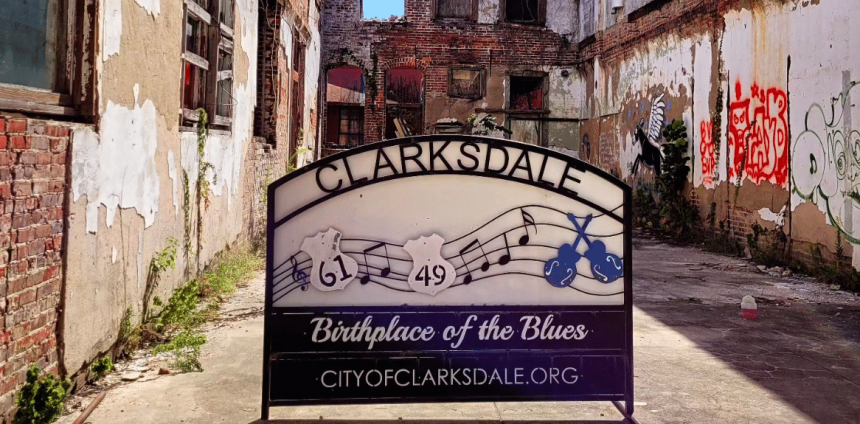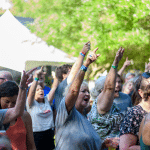Mississippi coins itself as the birthplace of America’s music and no city in the Magnolia State magnifies that more than Clarksdale — the town where the blues found its origins.
In the Delta town, one can discover where soulful music grew into a wildly popular genre nationwide, the icons who made the songs come to life, and some of the best food a state known for culinary excellence has to offer.

The Crossroads
During the American Civil War, white soldiers noticed that their Black counterparts sang different songs about the war, in which they emphasized less harmonious tones. This music led to the emergence of the Delta blues, which began as an embellishment of field hollers and work chants. This style of music rose to popularity in the Deep South and was elevated to great heights by a handful of artists, most notably Robert Johnson.
Born in Hazlehurst in 1911, Johnson spent his early years living in Tennessee, Arkansas, and the Mississippi Delta. During his time in Memphis, his affinity for music developed. Though he was initially known as a relatively skilled harmonica player, Johnson was infamously jeered for his subpar guitar skills.
Johnson, on a journey to an area near his birthplace in pursuit of his biological father, came across a different discovery. After learning from guitar greats Son House and Ike Zimmerman – a man said to have learned supernaturally to play guitar by visiting graveyards at midnight – Johnson supposedly had a supernatural encounter for himself at the crossroads of Highway 49 and Highway 61 in Clarksdale.
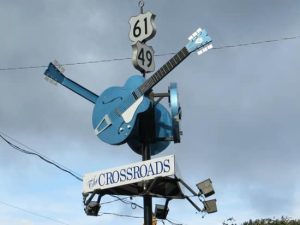
As the legend goes, Johnson met the devil at the crossroads where he is rumored to have given the prince of darkness his soul in exchange for extraordinary guitar-playing skills. The blues singer later mentioned this mythological account in his song “Cross Road Blues.”
After the famed deal with the devil was reached, Johnson became an immensely popular musical journeyman everywhere he went with a unique ability to entertain crowds all over the U.S. More importantly, he was a trailblazer who paved the path for later musicians to achieve success in the blues sphere.
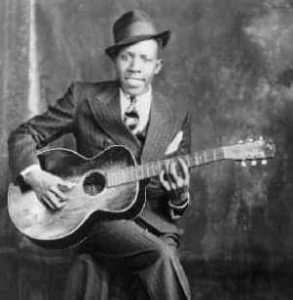
Johnson died of unknown causes in Greenwood at the young age of 27 in 1938, though theories of his passing have circulated. But his legend continues to live on to this day as the Rock and Roll Hall of Fame considers Johnson the first-ever rock star. Folks eager to witness where the legend of Johnson and the devil’s encounter is said to have occurred are welcome to visit the commemorative monument at any time.
Delta Blues Museum
The legend of Robert Johnson paved the way for future blues artists, such as B.B. King and Muddy Waters, and their stories come to life at Mississippi’s oldest music museum.
Since 1999, the Delta Blues Museum has been housed in the historic Clarksdale freight depot, built in 1918 for the Yazoo and Mississippi Valley Railroad. The building was designated as a Mississippi Landmark Property in 1996. The former freight area and the adjacent Muddy Waters expansion — about seven thousand square feet of ground floor space — is devoted to permanent and traveling exhibits.
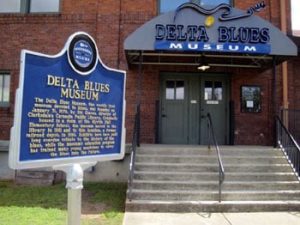
Most recently, the Delta Blues Museum dedicated August as John Lee Hooker Month in honor of the late legendary Mississippi bluesman. In keeping with this new annual tradition, a special exhibit has been unveiled with memorabilia provided in connection with the University of Mississippi’s Blues Archives and the John Lee Hooker Estate.
The museum is open Monday through Saturday from 10 a.m. to 5 p.m. with final admissions no later than 4:30 p.m. Prices can be found here.
Ground Zero Blues Club
The music that put Clarksdale on the map is still alive and well in the small town, especially at Ground Zero Blues Club. A venue co-owned by Mississippi Delta resident and Academy Award-winning actor Morgan Freeman, the facility serves to showcase modern-day Delta blues musicians.
Located in the heart of downtown Clarksdale, just next to the Delta Blues Museum, Ground Zero Blues Club gives visitors the privilege of immersing themselves in an intimate experience with Mississippi’s finest music in the present.
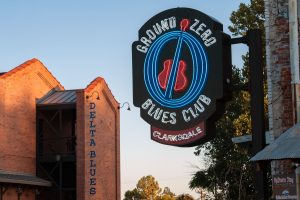
Ground Zero Blues Club is open from 5 p.m. to 11 p.m. on Tuesdays and Wednesdays and 11 a.m. to midnight on Fridays and Saturdays.
Hopson Commissary
One of the most distinctive historic centerpieces of the Mississippi Delta that has been converted into a modern-day multipurpose facility is the Hopson Commissary — a 100-year-old building that originally served as the commissary for Hopson Farm in the early 1900s.
Deeply rooted in history, in 1944, International Harvester introduced the first cotton picker at Hopson Farm. The plantation was the first in the world to grow and harvest a commercial acreage of cotton produced completely by mechanical methods.
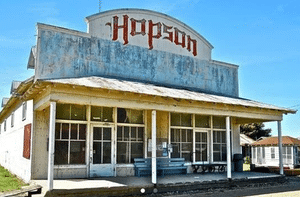
Today, the facility operates as a music venue, restaurant, and tourist attraction filled with antique relics and other artifacts from Mississippi’s blues and agricultural past. During the day, visitors can enjoy a fresh farmer’s style lunch at the market while shopping for antiques. At night, guests can enjoy a spirit (or two) while enjoying music from local performers. A loft is even available to be booked by those who may be interested in spending the night at the commissary’s grounds.
Murals
The music and culture embodying Clarksdale can also be viewed in the form of art throughout the Delta town.
From murals honoring Robert Johnson and other iconic blues performers to paintings highlighting famous Mississippi-based playwright and screenwriter Tennessee Williams, just one stroll through Clarksdale will take guests through Mississippi’s rich entertainment history.

Also scattered throughout town are painted walls of animals and other artworks destined to catch the eyes of careful observers.
BAM Fest
What better way to highlight that Clarksdale is the foundational city of the blues than an annual event celebrating such a feat? Each year, the Birthplace of America’s Music (BAM) Fest pays homage to the blues and all the other genres that stemmed from it.
BAM Fest is typically a multi-day affair that takes place in over 10 different venues in the downtown area featuring performances from live bands. Artists perform in all the area juke joints, blues clubs, event centers, and staging areas.
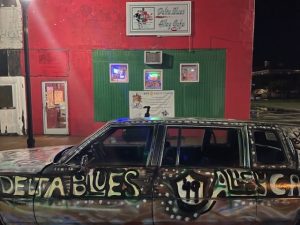
Folks from all over the map have attended the festival to get a taste of the music that continues to touch the soul of America. Part of BAM Fest organizers’ mission is to bring people from all races and backgrounds together through the unifying power of song.
Dining
Located in the heart of downtown Clarksdale, Delta Blues Alley Cafe serves as both a lunch stop and a popular destination for night owls. With menu items ranging from juicy burgers, wings of all flavors, rib tips, and more, visitors are destined to enjoy a taste of the Delta while soaking up the ambiance of the blues-themed restaurant.
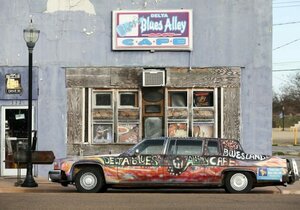
Another popular dining spot, Hooker Grocer & Eatery, touts its location as a “stone’s throw away” from the Delta Blues Museum and Ground Zero Blues Club. Named after the famed John Lee Hooker, the restaurant serves dinner Wednesday through Sunday and seeks to facilitate live music in its intimate setting at least biweekly. Diners can indulge in a variety of food options from famous southern po’boys to seafood delicacies, and of course, a fried catfish platter.
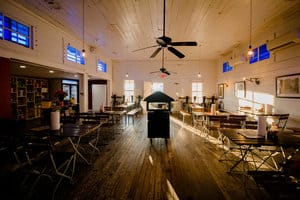
Early risers are in for a treat if they visit Yazoo Pass. Located inside the old Woolworth’s Building in downtown Clarksdale, the espresso bar, bistro, and bakery offer breakfast and lunch six days a week. A multitude of fresh coffee and espresso-based beverages are crafted to pair with a breakfast food choice or lunchtime dish Mondays through Fridays. From Wednesday through Saturday, guests are invited to eat dinner at Yazoo Pass and explore daily specials or choose from a variety of seafood, pasta, and handheld options.
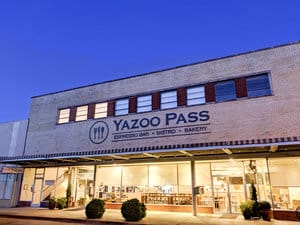
Unlike any other Mississippi city, Clarksdale brings history to life through its distinguishing attributes, a culture packed with pride in a rich musical prowess, and a present enthusiasm for what the Delta community can continue to bring to the table.
The above article is one of eight stories that will be presented by SuperTalk Mississippi News throughout the summer months, highlighting some of the gems that make Mississippi a great place to live, work, and play.


